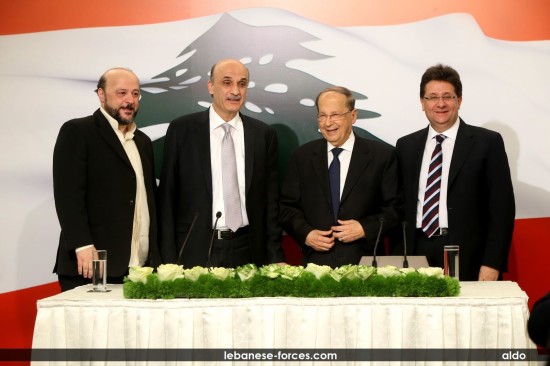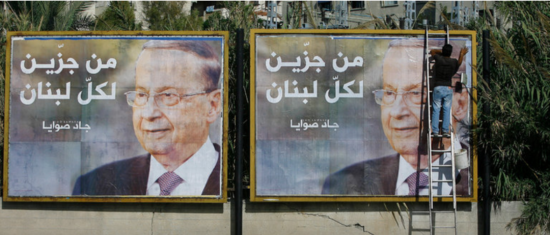
[Published at The Century Foundation blog.]
Monday evening Lebanon’s two most powerful Christian political bosses set aside decades of enmity – including many years when the two men’s militias were locked in a death match whose collateral damage included much of Lebanon itself – to join forces in the race for the country’s presidency.
The announcement was not altogether unexpected, and marked a powerful shift of alliances within the slate of warlord factions that runs Lebanon. For those familiar with the history of the civil war and the bitter rivalry between Michel Aoun and Samir Geagea, it’s a shock to the system to see the two men on the same side. It’s an important reminder that in politics, even Lebanese politics, all things are possible; personal and ideological feuds don’t preclude common ground and tactical alliances.
Geagea’s decision to support Aoun might be many things, but it is not a game changer.
“We must leave the past in order to build a future,” Aoun said in the press conference with his long-term rival and new friend. But he was only talking about the two men’s past disputes; he wasn’t talking about leaving behind a hidebound political system firmly trapped in the past. If anything, an Aoun presidency that reinvigorates the role of Lebanon’s Christian parties will take the old system off life support and inject it with new vigor – while stymieing any push for a more representative election system, which would privilege groups with the large and growing numbers of followers, most prominently Hezbollah.
Lebanon is still run by an anti-democratic cabal of hereditary warlords, and the major groupings for now remain intact. The March 14 and March 8 blocs are so loose, and so bereft of a shared ideology or political vision, that it’s hard to imagine them enduring much longer. Even their members are hard pressed to define either side by what it stands for rather than what it opposes.
In any event, even if the wider alliances fracture and regroup, there’s no reason to believe we’re witnessing anything more than a rearrangement of the supporting cast. The main event is the sectarian power struggle for primacy between Hezbollah, the Shia movement whose influence has been on the upswing for two decades, and Lebanon’s waning Sunni community (a contest that mirrors and reflects the regional battle between Iran and Saudi Arabia).
Saad Hariri, the Lebanese Sunnis’ first among equals, has been fighting what seems to be an inevitable consignation to the second-tier, a result of his own shrinking fortunes and political missteps, intra-Sunni fragmentation, the demographic shift of Lebanon’s population and wealth, and the regional feud between Iran and Saudi Arabia.
Throughout the 20-month presidential vacuum, my guess has been that when the major brokers finally decide Lebanon needs a president, they will resort to a lowest-common denominator consensus candidate, someone who can get the job done without providing any faction with a notion of victory. In other words, no polarizing zaim like Aoun, Geagea or Suleiman Franjieh. Pushed to bet on a name, I’d pick the current head of the military, Jean Kahwaji, a safe choice to preserve security without tipping the political balance or posing a threat to the hereditary majors.
Monday’s announcement makes that outcome more unlikely, although still possible in the opaque, faction- and personality-driven layered negotiations that characterize Lebanese politics.
Geagea and Aoun have been growing closer since last summer, and as Lebanese commentator and Daily Star columnist Michael Young points out, both men see a great danger to the long-term viability of their status and their entire movements. If Muslim politicians get to select the Christian president, if Christian political parties act effectively as filler in political coalitions dominated by Sunni and Shia bosses, then what’s the future of the Lebanese Christian community, much less its political leaders? Power in Lebanon remains entirely rooted in sectarian quotas, patronage networks, and power-sharing agreements, not individual voting rights or secular law.
Does the Aoun deal really signify an alliance shift and a fracturing of the March 14 coalition? Or is it an organic reassertion of Christian dealmaking, reminding kingmakers like the Druze leader Walid Jumblatt and actual kings like Hezbollah’s Secretary General Hassan Nasrallah and the weaker but still “royal” Hariri, that the Christian lock on the presidency, in Lebanon’s weird system, does endow Christian parties with actual power should they opt to use it?
The last year’s evidence points to the latter theory. If that’s correct, then a reassertion of Christian political initiative should be understood as reactionary rather than radical shift. From a historian’s perspective, it’s a clear, conservative step back onto the solid ground of the 1943 National Accord and its descendants, sectarian power-sharing compromises that put national governance second to the preservation of sectarian fiefs. In many ways, it restores equilibrium to a rigid and fragile system, postponing any root-and-branch reform project, which would exacerbate every group’s communal fears and might destabilize the entire country. Since the Civil War broke out in 1975, warlords have never stopped making the decisions in Lebanon. Relative power has shifted within the cabal of warlords, but so far no one has posed a systemic challenge to the basis of their rule.
Some Lebanese politicians, especially those who oppose Hezbollah, the Assad regime in Syria, and Iran’s influence, might be tempted to see in the presidential deal a fruit of the Iran nuclear accords, a further tilt toward Iran in the Levant. It’s more likely that the Lebanese presidential pragmatism is a response to the same underlying conditions that made the nuclear deal possible: a hard-headed calculation about numbers, power and possibilities. Hezbollah and its allies are stronger than their opponents in Lebanon, so their side has had the leverage in the presidential standoff. As in Syria, relative strength doesn’t guarantee that the stronger party gets everything it wants, but it does make the opposite unlikely. Until now, in Lebanon, the March 14 side has held onto the vague hope that it can somehow drive the choice of president, or even anoint its own candidate. But March 8 holds more cards and will get the better end of whatever deal is reached, even one in which Saad Hariri gets to return as prime minister.
Meanwhile, Lebanon’s demography marches onward, its Shia plurality bustling and its Sunni and Christian communities in decline (so long as Syrian refugees don’t enter the calculation). The preferences and identities of the country’s population are ever farther removed from the sectarian quotas that shape electoral results and the upper reaches of Lebanon’s government. Not a single major political party of warlord has atop their agenda any policies that advance rule of law, citizenship or fair elections, which would posit an alternate path to protecting pluralism and minority rights.
A full rapprochement between Geagea and Aoun changes the lineup; it does not, as some breathless reaction would suggest, in any way change the game.




